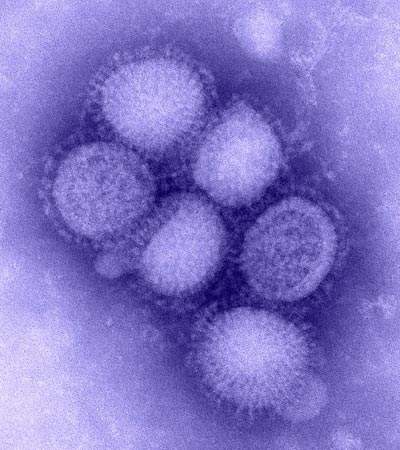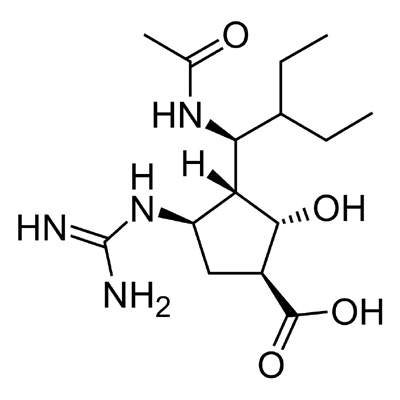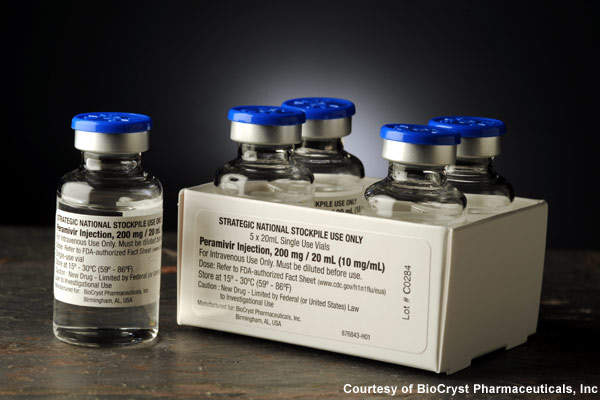Rapiacta (peramivir) as is a neuraminidase inhibitor discovered and developed by BioCryst Pharmaceuticals for the treatment of the influenza virus. The drug is in clinical trials for treating patients with life-threatening strains of the influenza A viruses H1N1 (swine flu) and H5N1 (bird flu). Peramivir is also used for inhibiting influenza B viruses. With the drug, sites of infection are delivered with plasma concentrations, to prevent the spread of neuraminidase enzymes within the host.
In January 2010, Shionogi received manufacturing and marketing approval for Rapiacta to treat influenza patients in Japan. Shionogi had filed a New Drug Application in Japan for its approval in the country in November 2009.
Peramivir was approved by the Korean Food and Drug Administration (KFDA) in August 2010.
The US Food and Drug Administration (FDA) granted emergency use authorisation (EUA) in October 2009 for the antiviral peramivir in intravenous (IV) formulation for the 2009 H1N1 influenza. It is the only IV antiviral drug authorised by the FDA under EUA for the treatment of acute influenza. The drug is cleared by renal filtration and its half life in patients with normal renal function is 7.7 to 20.8 hours.
The FDA levied the drug’s EUA only in hospitalised and certain adult and paediatric patients with suspected or confirmed and complicated cases of the H1N1 influenza, after a request from the US Centres for Disease Control and Prevention (CDC).
The FDA has imposed conditions that the IV peramivir can be used only in cases where alternatives such as oral or inhaled antiviral therapies are ineffective; or if the antiviral drug delivery by other means such as inhalation or enteral is not feasible in patients; or for adults where the IV is considered appropriate ensuring the right dosage is administered by clinical judges. The EUA was issued after reviewing the available scientific data about the drug. BioCryst is also developing the injectable version of peramivir.
BioCryst has partnered with Shionogi in Japan and Green Cross in Korea for the development of IV peramivir. Under an agreement in 2007, Shionogi is an exclusive licence holder for the development and commercialisation of the drug in Taiwan and Japan. Green Cross is responsible for the development, regulatory approvals and commercialisation of peramivir in South Korea as per an agreement with BioCryst in 2006. All the rights for commercialisation of the intravenous drug in other countries worldwide are held by BioCryst.
Peramivir development and efficacy
BioCryst in partnership with Johnson and Johnson (J&J) worked to develop the oral formulation of peramivir. In 2001, however, J&J abandoned the partnership due to its poor bioavailability and failure of the drug in clinical trials. Its bloodstream was found to be inefficient when consumed orally. Moreover, the market for flu antivirals then was low. The need for injectable antivirals was significant to treat patients who have difficulty with inhaled or oral medicines.
In January 2006, the FDA awarded Fast Track designation for the development of a parenteral injection formulation of peramivir to speed up the drug’s review and approval, in a contract with BioCryst.
In January 2007, the US Department of Health and Human Services (DHHS) awarded $102.6m to BioCryst for the development of peramivir targeting pandemic and seasonal influenza. The funding was to support its manufacturing, Phase II and III clinical studies in the US, manufacturing process and validation of peramivir in US manufacturing facilities and for all the required approvals.
Peramivir showed activity against the pandemic H1N1 swine flu 2009 outbreak and on its associated origin viral strains. The drug was studied in about 1,800 complicated and uncomplicated influenza-infected patients.
Clinical trials show positive results
The drug is in Phase III clinical studies in the US.
In July 2009, peramivir showed positive results for the two Phase III studies on patients suffering from seasonal influenza. The study was conducted in 2008–2009 and was sponsored by Shionogi. Green Cross co-conducted the studies in Korea.
The three-armed, multi-centre, randomised, double-blind, multi-national Phase III study conducted by Shionogi compared the safety and efficacy of the drug with a single dose of 300mg and 600mg a day with a double dosage of oral Tamiflu (oseltamivir phosphate 75mg) for five days on 1,099 patients. The median time to alleviation of symptoms in the patients treated with 300mg and 600mg of peramivir, and oseltamivir were 78, 81 and 81.8 hours respectively.
Shionogi conducted the study with dosing over more number of days on 42 influenza patients with more complications and high risk such as diabetes and chronic respiratory disease patients who required pharmacotherapy and immunosuppressive drugs. The study on 300mg and 600mg dosages proved the drug to be safe and tolerable.
In June 2007, BioCryst conducted two Phase I clinical studies of intramuscular formulation of peramivir on 51 healthy adult volunteers and it was well tolerated. The Phase II trial of the drug in hospitalised influenza patients was completed in 2008.
The double-dummy, active-controlled study on 137 hospitalised patients who were tested positive by the rapid antigen test for influenza, was conducted in the US, Canada, South Africa, Singapore, Hong Kong, Australia and New Zealand during 2007 and 2008. The Phase II study of IV peramivir with single dose of 300mg and 600mg in outpatients with acute, uncomplicated influenza was also effective and well tolerated.
Data from a Phase III safety and virology trial conducted to evaluate the efficacy of the drug in severely hospitalised patients was released in January 2011. Around 234 patients aged between 14-92 were enrolled. It was observed that the symptoms were relieved in 145 hours and patients returned to normal activities within 26.8 days
In November 2009, a Phase III trial was initiated to evaluate the safety and efficacy of the drug in seriously hospitalised adults and children older than 12 years. Around 600 patients have been enrolled at 192 locations. Adult patients are being administered with 600mg of peramivir once daily, and children are administered 10mg/kg of drug once daily, for a period of five days. Remaining patients are being administered a placebo. The trial is expected to be completed by May 2013.
Around 63 children have been enrolled for Phase I/II clinical trials being conducted to evaluate the safety and efficacy of the drug in hospitalised children. The study was started in January 2011 and is expected to be completed by December 2012.
Influenza virus
The highly pathogenic H5N1 flu virus which spreads through birds causes avian influenza. The influenza is mainly caused by human direct contact with infected poultry rather than from human-to-human contact. The virus causes respiratory tract disease.
Some of the seasonal flu strains can be more severe, causing life-threatening complications. Influenza can more seriously affect young children and elderly people and those with weaker immune systems.
The CDC reports that an average of 36,000 people die and nearly 200,000 patients are hospitalised from flu-related complications in the US annually. The World Health Organization (WHO) declared the H1N1 (swine flu) virus to be pandemic and on 12 June 2009 raised the alert level to six.
Marketing commentary
BioCryst is developing peramivir under a recently modified $180m (additional $77.2m) contract from the Biomedical Advanced Research and Development Authority (BARDA) within the DHHS. The company has shipped an initial order of 10,000 courses of IV peramivir to the DHHS for an initial $22.5m order in November 2009. The company expects to receive an additional 40,000 courses of the intravenous drug from the DHHS.
By October 2009, the company had 42 requests for the drug from physicians in the US for the treatment of swine flu. BioCryst has partnered with Neopharm, NT Pharma and moksha8 Pharmaceuticals to market and distribute peramivir for seasonal influenza in Israel, China and Brazil/ Mexico respectively on country regulatory approvals.





